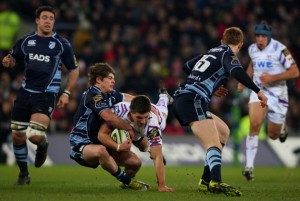By Paul Williams
Stephen Jones still divides opinion
Stephen Jones has announced that he will retire at the end of the season. Jones has had a magnificent career – racking up 104 caps for Wales and six for the Lions. Yet despite his achievements, many in Wales seem unimpressed with his contribution. During the bulk of Jones’ career critics openly yearned for a 70’s style outside-half who could dance his way through the ten channel – Jones’ critics often failed to notice that the modern ten/twelve channel had become one of the most well-defended zones on the pitch. Faced with modern defences Jones was a very modern outside half; controlling the game with accurate line kicking, dependable tackling and highly reliable goal kicking – he also made more line breaks than people care to remember. Sadly, Jones may have played in the wrong decade. His skillset is now regarded as the blueprint for outside halves – players such as Owen Farrell and Jonathan Sexton are lauded for their abilities. Jones was also, unfairly, given the nickname of ‘Wellies’ due to his perceived stodgy playing style. But remember; wellies are also watertight. Stephen Jones should be regarded as a Welsh great.
London Welsh – the drama continues
It appears London Welsh’s season has been written, produced and directed for TV. It’s the only possible explanation. They entered the Premiership, against the odds, in the style of a courtroom drama. Their performances have been heroic – with some of the biggest clubs in English rugby failing to read the script. And now a serious administrative error, the illegal registration of scrum-half Tyson Keats, means that we can look forward to a cliffhanger ending. To squeeze every last drop out of this metaphor, sadly, I don’t think this drama will have will have a particularly happy ending.
Admiration for Ryan Jones
Ryan Jones has been superb since his introduction to the Six Nations. His performances contributed directly to Wales ending their losing streak. But whilst his performances on the field have been impressive; the circumstances in which he now performs are also worth a mention. Having been the long-term captain, and the darling of Welsh rugby for many years, Jones is no longer the focal point of the Welsh squad. He no longer has a shirt to call his own and has become a utility player – yet he never complains or sulks. To use club rugby terminology; he’s the bloke who turns up every Saturday morning with his kitbag, keen as mustard, and will play in any position. Christ, if Scotland turned up next weekend with only fourteen players Jones will undoubtedly don the navy of Scotland just so that the fixture can go ahead. I’m being facetious, obviously, because the Ospreys and Wales need Ryan Jones more than ever. And let’s not forget, the Lions may also need a squad player with that sort of attitude.
The ‘Flying Wedge’ is alive and well
The ‘flying wedge’ is outlawed in rugby. It involved a large number of players binding together and carrying the ball as one deadly rolling mass. However the ‘mini flying wedge’ is alive and well. It is often referred to as the ‘leech’ whereby a ball carrier drives into contact and then a supporting player binds onto his thigh and drives him forward. However, it is becoming increasingly common to see one or two ‘leeches’ binding onto the player before contact – resulting in one defender dealing with the body weight of three – it seems incongruous in an age where player safety is of upmost importance. This is of course an issue that affects the whole of rugby – not merely in Wales. But it dawned on me during the Ospreys’ 24-7 win over Edinburgh; hence its inclusion.
Silence isn’t golden. It’s worrying
Another month has passed yet still no mention of a plan to rescue regional rugby. The Professional Rugby Game Board (PRGB) was announced in December and already rumours of internal wrangling persist. It is alarming that the board which was created to help re-organise regional rugby is allegedly struggling to organise itself. And whilst nobody expects the PRGB to solve the issues in a matter of weeks, it would be reassuring to know that something is being achieved behind closed doors; that discussions have taken place and progress is being made. The PRGB needs to disseminate information to the public – whether it is conclusive or not. These aren’t typical board meetings and the PRGB needs to realise that. There may be only nine members around the table, four members of the Welsh Rugby Union, one from each of the four regions, plus an independent chair – but there are three million stakeholders in Wales. The future of regional rugby affects everyone. It is our national game and we deserve to know what is going on.








